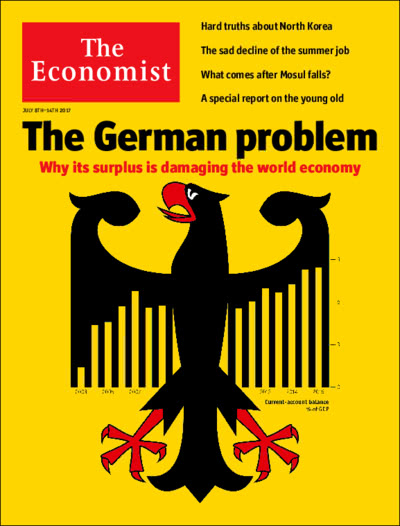 |
| More like Appeasement, the British Problem |
I read the economist quite a bit. Their cover story an issue ago was one of the worst pieces of writing by the Economist since they advocated for the second Iraq war. They appease protectionist and mercantilism instincts with some very fuzzy logic, arguing that it is a bad thing that Germany has a current account surplus (basically a trade surplus). The title says "Why Its Surplus is Damaging the World Economy" but I read it and I still don't know.
The closest they come to explaining anything is:
"For a large economy at full employment to run a current-account surplus in excess of 8% of GDP puts unreasonable strain on the global trading system. To offset such surpluses and sustain enough aggregate demand to keep people in work, the rest of the world must borrow and spend with equal abandon."
Yes a current account surplus must be balanced out by deficits elsewhere, but why is it a bad thing for the rest of us that a surplus exists in one country? Again, a current account deficit in a country means it also has a capital account surplus (trade deficit means investment surplus, see prior post), so there's no net impact on GDP. Is this just some puritanical anti-debt instinct?
Their solution to the problem they can't fully explain seems to be for Germany to raise wages (which are set by the market and already among the fastest growing in the EU since the Great Recession) so that their exports are less competitive so that their neighbors can catch a break. Why isn't the solution for Germany's neighbors to reform (as Germany did in the late 1990s / early 2000s) and become more competitive? How would a less competitive Germany (such as it was pre-reform) be good for the world?
Anyway, Scott Sumner, one of my fav economists (as I've said before) beat me to this (again). So here's the highlights:
"The Economist confuses trade and aggregate demand, which are entirely unrelated issues...
We know that Italy, Greece, and Spain were not "forced" to run large deficits by Germany, because Italy and Spain have sizable surpluses, and Greece's current account is roughly balanced...
It's true that at a global level a German CA surplus must be offset by an equal deficit elsewhere. But the German economy is only a very small percentage of the global economy, so a Germany CA surplus of 8% of GDP implies a "rest of world" deficit of far less than 1% of GDP...
Even in a world with zero debt, there would be large and persistent CA imbalances as assets are bought and sold across borders."
Perhaps its noticeable, but international accounts is not a strong suite of mine. That's because of how little it matters. This kind of junk used to be important in the world of fixed exchange rates (such as the Gold Standard or the Bretton Woods System), where a change in the balance of a country's international accounts could force it to abandon its fixed exchange rate peg. But in a world of flexible exchange rates set by the market this stuff just takes care of itself and has no significant implications for anything. So from a global perspective Germany's trade surplus is insignificant.
However, the Euro area is a fixed exchange rate regime. This is the real issue that the Economist missed, instead they are freaking out about symptoms rather than the cause. If Germany and its Euro area trading partners had flexible exchange rates Germany's currency would most likely appreciate and its partners' depreciate, making Germany less competitive relative to them. The result would be a lower trade surplus for Germany. Instead Germany's Euro area trading partners can only become more competitive through structural reform or lower wages or the dumb suggestion that Germany make itself less competitive.
If there are any problems within the Euro zone due to Germany's trade surplus with the world, it is because of the fixed exchange rate regime. But even this may be meaningless; as noted above Italy and Spain also run surpluses despite being in a fixed exchange rate regime with Germany. So why is Germany's surplus a problem? The best answer I can find is that it isn't. Stop appeasing protectionists. Free trade forever.
No comments:
Post a Comment